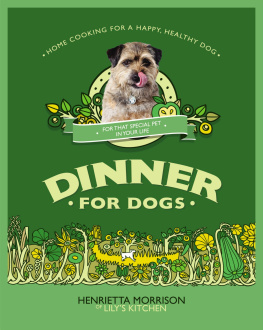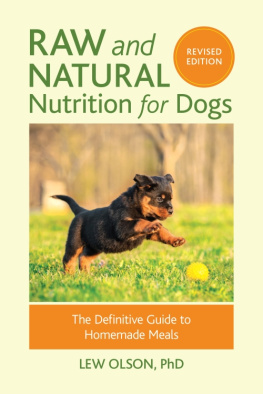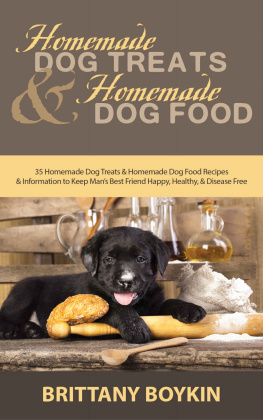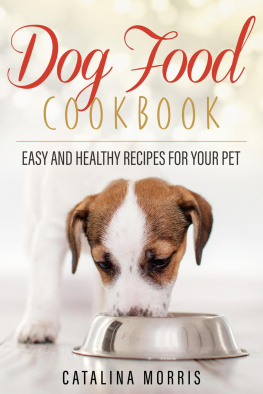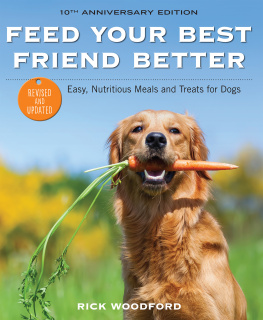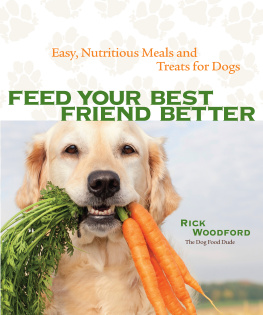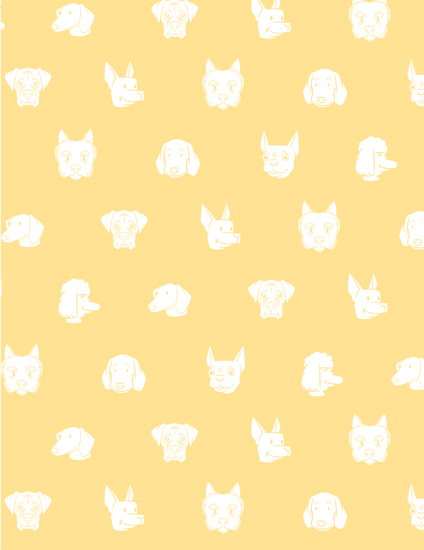




DEDICATION
For all the victims of Hurricane Sandy here on the South Shore. And in loving memory of my father, John Filardi.

FOREWORD
I am a veterinarian who has, over time, evolved a more natural and holistic approach to medicine. Since graduating from veterinary school in 1994, I have pursued various opportunities to incorporate alternative healing modalities into my practice because I have seen the amazing health benefits they offer.
Recently, the demand for natural products and alternative services for pets has increased dramatically and the marketplace has responded accordingly. As people are experiencing the benefits of a more holistic approach to their own healthcare, many are seeking the same for their pets.
The term holistic veterinary care is actually a very simple concept. It means looking at the whole patient, which includes the medical history, diet, environment, potential toxin exposure, stress factors, and the animals relationship with its owner. A treatment protocol is developed, integrating the best traditional and alternative options. In my view, this integrative approach is the way all medicine should be practiced. (In most acute situationsfor example, severe trauma or certain types of infectionshowever, the best treatment will involve modern surgical techniques and drug therapy from conventional Western medicine.)
Many alternative therapies offer preventive benefits in healthy pets, can be used as an adjunct in acute conditions, andmost importantcan be used to determine and treat the root problem in many chronic conditions. I utilize a wide variety of holistic treatments in my practice, such as acupuncture, low-level laser therapy, and herbal and homeopathic remedies. The common principle of all these treatments is to restore balance and homeostasis in the patient to promote healing. These techniques are used to treat a wide variety of conditions including arthritis, disc disease, allergies, anxiety, and chronic pain.
The cornerstone of a holistic approach to healthcare is proper nutrition. Just like us, our pets truly are what they eat, and I believe in feeding a species-appropriate diet. The highly processed kibble and canned foods we have fed our pets for decades are not the best we can offer them. I advocate all-natural foods that are the least processed and most species appropriate and recommend both raw and home-cooked diets that are complete and balanced. Periodically changing the protein source and limiting or removing grain will decrease the risk of the pet developing allergies.
When I counsel a new puppy or kitten owner, the first thing I discuss is diet, because it is that important. I tell owners that feeding a complete and balanced raw or home-cooked diet that has the proper ratio of quality ingredients and supplements is the best they can do for their pet. In my practice, I have personally seen dramatic improvements in the health of patients with diet change alone. Getting pets off of highly processed dry food and onto natural whole foods that include meats, vegetables, limited grains, and appropriate supplements is the first step. I have seen myriad problems, such as obesity, allergies, skin problems, and gastrointestinal issues, improve dramatically or resolve completely by simply changing to an appropriate raw or home-cooked diet.
I believe what is espoused in human medicine should be the same principles we follow with our pets: Eat a healthy, balanced diet; drink pure water; avoid toxin exposure whenever possible; exercise; maintain an appropriate weight; and get plenty of rest (which most of our pets never seem to have a problem doing!). This book is a great tool to help your dog get started on the journey toward healthier living.
Dr. Wayne Geltman, DVM
ALL CREATURES VETERINARY SERVICES
LONG BEACH, NEW YORK
INTRODUCTION
Ive learned its the small, seemingly unremarkable events that have the most impact on our lives. This is especially true of my journey to becoming a holistic chef for animals. As a dog owner and an animal lover, there have been countless little moments and experiences with my dogs that have made me stop and reevaluate my approach to their care. I constantly ask myself, what can I do to make their lives better? Am I really doing everything I can to ensure they are leading happy, healthy lives?
One such event occurred several years ago, when I was watching my shepherd mix, Madeline, play with a marrow bone on the living room rug. Marrow bones are one of my favorite things to give my dogs as treats because theyre excellent for their teeth and they keep the dogs busy for a good hour or two. Countless days I watched my dogs enjoying these bones on the living room rug, until one day I noticed something I had never really considered before. Madeline spent a lot of time with her marrow bone. She would toss it in the air, drop it on the rug, and pick it up over and over again. As I watched her, I wondered what the wet bone was picking up from the rug and transporting into her body. At that point, Madeline had been suffering from chronic upset stomach and digestion issues. I found myself steam-cleaning the rugs weekly because she was constantly getting sick on them. Then it occurred to me: Was she constantly getting sick because I was constantly steam-cleaning the rugs?
It became obvious to me, as I watched Madeline with her marrow bone on the living room rug that day, that the products I was using to clean the rugsand quite frankly my whole apartmentwere probably causing her upset stomach. I eventually removed all of my rugs. One day, several weeks later, I passed the steam cleaner collecting dust in the basement. At that moment I realized that since removing the rugs, Madeline hadnt gotten sick once. It was from this experience that I began to question how my living environment was affecting the health of my pets.
Then, in 2005, I met Boo. I was volunteering with Animal Control of Westchester County, New York, when I walked past a dog that had recently come into the shelter. His name was Boo, and he was not in good shape. He had lost nearly half of his fur, exposing reddish-pink, raw, inflamed skin. He was itching incessantly. I was completely overwhelmed by the sight of him. I went straight to the office to inquire about his condition but no one seemed to know what was wrong with him or how else to help him. This answer felt instinctively wrong and confusing to me.
I decided at that moment I would take Boo home as a foster dog. On June 6, 2005, I walked out of the shelter with Boo and a box of numerous medications I was told he would be on for the rest of his life.
The first thing I did when I got home was throw out the box of medications. I was convinced that I could nurse him back to health without any medicine at all. It took me nine months to completely transform his health on a regimen of supplements and home-cooked and raw dog food. All his hair grew back, he no longer suffered from inflamed and itchy skin, and his coat began to shine. He was with me for five years before he passed away in July 2010, and I hope they were the best years of his life.
Next page

